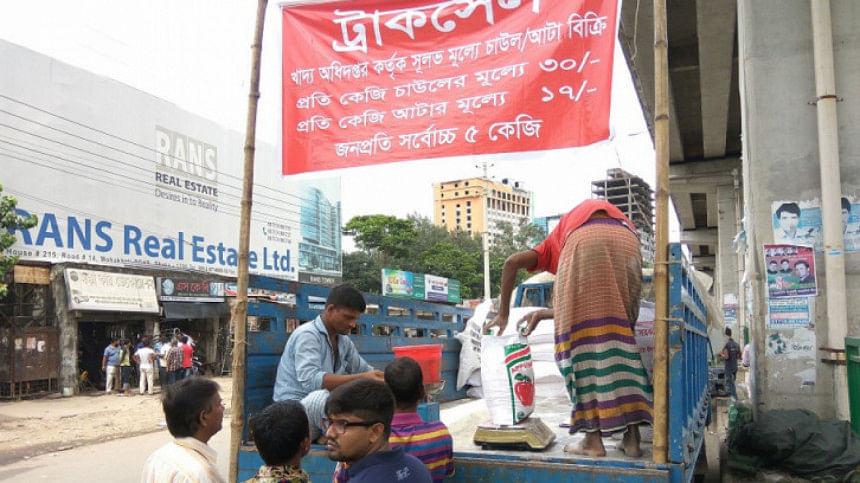Anomalies take shine off OMS

As the Covid-induced lockdown was taking a heavy toll on the poor back in 2020, the food directorate sold rice at subsidised rates under special and regular Open Market Sale programmes across the country.
But allegations of irregularities tainted this good initiative to help cushion the poor from the lockdown impacts.
The Comptroller and Auditor General detected financial anomalies involving Tk 60 crore in the distribution of around 70,000 tonnes of rice in fiscal 2019-20.
In its latest report, the CAG said the Directorate General of Food sold 70,035 tonnes of rice worth Tk 59.33 crore to OMS dealers. But it didn't deposit the money with the public exchequer.
The auditee was asked to furnish information on the treasury chalan, but it could not provide any proof of depositing money with the exchequer, according to the CAG audit report placed before parliament in June.
"… It proves the money was not deposited with the treasury at all," read the report.
Of the 70,035 tonnes of rice sold to OMS dealers, 68,300 tonnes were distributed under a special OMS programme and 1,653 tonnes under a regular one.
According to the report, the food directorate in its reply told the auditors that its field offices are tasked with preparing the treasury chalan and distribution order and also carrying out verification. And all relevant records are preserved by the chief controller of Dhaka Rationing Office.
"Since the DG Food doesn't preserve records, it was not possible to provide the documents… therefore, the audit objection is not appropriate and logical," the DG Food said in its response, according to the report.
"… It proves the money was not deposited with the treasury at all."
The auditee even made a request for dropping the audit objection.
In its comment, the CAG says it's the responsibility of the DG Food to ensure that the money from OMS sales is deposited with the exchequer on time and keep a record as per the OMS policy. But the authorities didn't do that.
According to the Open Market Sale Policy, 2015, it is necessary to maintain a muster roll with details on sale of rice under the programme, along with the supervisor's signature.
However, the auditee couldn't produce 198 muster rolls that contain details on the sale of 973.65 tonnes of rice by the three offices -- the chief controller of Dhaka Rationing Office, upazila food controller of Savar and food controller office of Narayanganj.
In its reply, the DG Food said it would collect the muster rolls and inform the auditor about it. On December 31, 2020, the CAG issued a letter to the secretary at the food ministry but didn't get any reply.
The CAG also asked the DG Food to deposit the money with the exchequer.
OTHER ANOMALIES
Some other anomalies were found in the special OMS programme in Dhaka Division.
Of the 20,266 tonnes allocated for the division, around 1,000 tonnes of rice were not at all sold to the target group, mostly slum dwellers in the city, said the report.
The food directorate failed to show documents on sale of rice worth Tk 78 lakh, it mentioned.
The CAG found the chief controller of Dhaka Rationing Office didn't deposit with the exchequer Tk 15.95 lakh that remained unclaimed for more than three years. The money had been collected from OMS dealers as security money.
The same office collected from dealers security money lower than what is stipulated in the OMS policy.
As per the rules, a dealer has to deposit Tk 25,000, which is refundable, with the Rationing Office for getting dealership. But the office, on a number of occasions, collected Tk 20,000 from each dealer, causing the government to incur a loss of Tk 14 lakh.
Besides, two dealers were appointed by the upazila food controller of Sreepur in Gazipur without any security money.
In both cases, the DG Food told the audit committee that it would take steps in this regard and inform the CAG.

 For all latest news, follow The Daily Star's Google News channel.
For all latest news, follow The Daily Star's Google News channel. 







Comments